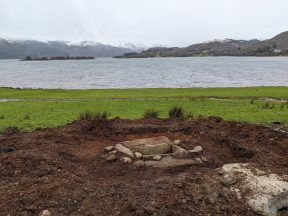Businesses across Scotland have been urged to prepare for a potential “lack of water” this summer following a dry winter.
The Scottish Environment Protection Agency (SEPA) revealed that this January was the seventh driest on record for the East Coast of Scotland.
Groundwater levels remain low despite storms in February, with businesses warned about a risk of water scarcity this summer.
The warning could affect businesses from food and drink production to hydropower generation, farming and golf course management.
SEPA is now hoping that releasing this information, along with new wet weather research, will better equip businesses for the dry months ahead.
Environment minister Mairi McAllan said: “In recent times, Scotland has experienced some of the driest conditions we have seen for many years, bringing water scarcity impacts for many businesses and households across the country.
“With climate change at the forefront of all our minds, the need to conserve water as one of our most precious natural resources is more crucial than ever.
“Indeed, the most recent report from the Climate Change Committee confirmed that drought will become more prevalent in years to come as summers in Scotland get drier and hotter.
“That’s why I urge everyone to use water wisely and to take advantage of the advice and guidance offered by SEPA and Scottish Water it benefits all of us, is good for our economy and our planet.”
Andrew Young, chairman of Girvan Early Growers, a co-operative of local farmers in Ayrshire, has said that last year was the driest he faced in 40 years.
He said: “I have been a farmer for more than 40 years and last year was the driest I have seen in my lifetime. We simply can’t grow high quality potatoes and carrots here without access to water.
“By working closely with SEPA, we can plan where the best locations are to grow our crops. We can also be flexible and abstract water from different sources depending on where the pressures are.
“Simply having that awareness and a clear back-up plan for drier months, allows us to operate our business as effectively as possible.
“Probably 30 years ago we would have turned around and just planted potatoes wherever we thought the land was good enough.
“We now have to make sure that the water availability is there to grow that crop. If the water is not there, there is no point in planting it.
“So, we have our relationship with SEPA through the water license system where we would try and plant crops to certain areas to where we can get water where the abstractions are available to us.”
SEPA’s head of water and planning, Nathan Critchlow-Watton, said: “It is vitally important that Scotland is prepared to deal with water scarcity now and in the future.
“Scotland needs to adapt to a changing climate, and we’re starting to see water scarcity events occurring more frequently.
“Businesses should use the information available to them to make informed decisions about reducing their reliance on water and to plan for and manage water scarcity events.
“Water scarcity used to be rare in Scotland, but since 2018 we’ve had a water scarcity event every year and we’re anticipating water scarcity in 2022, affecting some areas of Scotland as well.
“Looking further ahead, water scarcity will become more severe and more frequent across large areas of Scotland and businesses need to plan now to adapt to a changing climate.”
Follow STV News on WhatsApp
Scan the QR code on your mobile device for all the latest news from around the country




























